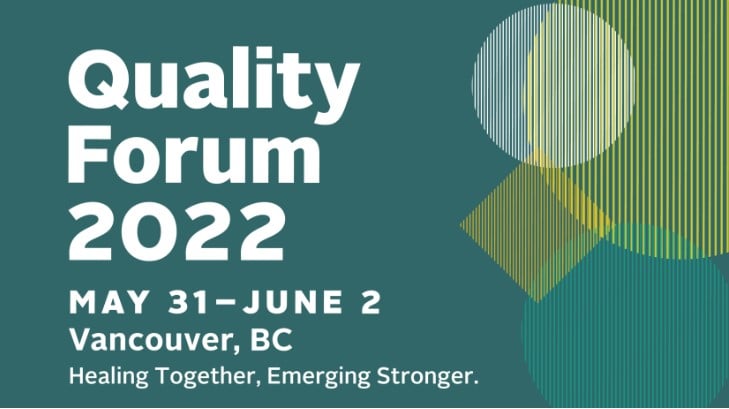 Come see BCCPC at the Quality Forum 2022, hosted by the BC Patient Safety and Quality Council on May 31 – June 2 in Vancouver.
Come see BCCPC at the Quality Forum 2022, hosted by the BC Patient Safety and Quality Council on May 31 – June 2 in Vancouver.
The Quality Forum brings together BC’s health care community to share and discuss how to improve quality across the continuum of care. You will find the BC Centre for Palliative Care in the poster hall and the presentation rooms:
Sessions:
Outcomes & Learnings from Implementing Community-Led Advance Care Planning Programs for People Living with Dementia & Family/Friend Caregivers
Rapid Fire Session – June 1, 3:30-4:30
Featuring: Pam Martin, Evaluation Lead
What it’s about: Despite universal recognition of its importance for people with dementia, literature identified that advance care planning (ACP) happens infrequently. In collaboration with community partners and people with lived experience, BC Centre for Palliative Care co-developed two programs to support community organizations facilitate ACP events for people with early stages of dementia and their family/friend caregivers. The programs were adapted from an existing successful, sustainable program that supports community-led ACP sessions for the public. The adapted programs aim to promote the engagement of people with dementia and their family/friend caregivers in ACP to help them get care consistent with their wishes.
The dementia-tailored programs support community organizations facilitate:
1. Guided group conversation events to help participants reflect on their values, beliefs and wishes for care, and
2. Information sessions to help participants get started with their ACP. Each program comprises of a training curriculum for the event facilitators and a toolkit of resources for organizers, facilitators, and participants.
Posters:
Current state, challenges, and successes of compassionate communities in British Columbia
Authors: Jasper Yoo, Rachel Carter, Ph.D, Dr. Eman Hassan
What it’s about: The compassionate community (CC) concept applies the public health approach to palliative care by actively supporting people affected by a serious health challenge, caregiving, dying, or grieving to live well. This can be done by connecting people to supports, raising awareness about end-of-life issues, or building supportive networks in the community. This approach has gained global recognition for mitigating psychosocial challenges common with serious illnesses. British Columbia (BC)’s compassionate communities are the first provincial movement to spark in Canada. It started through a seed grant program launched by the BC Centre for Palliative Care, which has supported over 100 CCs in BC with seed funding, training, resources, coaching, and networking. However, CC activities in BC have not been well studied.
Supporting people experiencing bereavement in British Columbia – A provincial evidence-informed approach
Authors: Rachel Carter, Ph.D, Joshua Black, Ph.D, Anica Butters, Nicolas Sparkes, Kathleen Yue, Dr. Eman Hassan
What it’s about: Following a death, many people seek support services to help them with their grief. While there are many services available to British Columbians to support grief, the scope of those available and their successes are not fully known. Furthermore, many traditional supports for bereavement have been disrupted due to the COVID-19 pandemic and many more people have been bereaved than normal, making this even more pertinent at this time. Our project aims to understand the experience of bereaved people and the supports they can access, with an aim of co-developing with stakeholders a provincial evidence-informed approach to improve access to bereavement services going forward and increase the effectiveness of the bereavement support being offered.
A Public Engagement Approach to Co-developing Advance Care Planning Resources for Hindi Speaking Communities in BC
Author: Pam Martin
What it’s about: The need for ACP resources for the Hindi speaking South Asian communities was identified as part of the evaluation of the culturally adapted advance care planning (ACP) resources previously released by BC Centre for Palliative Care (BCCPC) for the Punjabi-speaking South Asian communities. This initiative builds on the work done to adapt ACP to the Punjabi-speaking community.
In BC, Hindi is one of the fastest growing languages. In response, BCCPC has set out to adapt and translate its evidence-based ACP resources into Hindi while collaborating with community stakeholders to ensure the adaptation is culturally and linguistically sound. Intervention: Cultural and linguistic adaptation of ACP resources will be completed by a working group inclusive of Hindi speakers, cultural advisors and certified translators. The adaptation will be guided by information gathered from a previous environmental scan and interviews and focus groups with key informants. The translation of ACP resources to Hindi will be informed by bilingual working group and community members.
Public engagement is integral to resource development and a key contributor to resource acceptability and uptake afterwards. In this project, it is anticipated that the adaptation and translation of ACP resources will enhance the Hindi speaking communities’ levels of awareness and understanding of the value and steps of ACP and prompt them to share their healthcare wishes with their families and health-care providers, which can ultimately help people get care aligned with their wishes.

